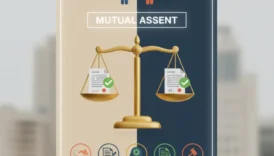Consideration in Contracts: Why It Matters

- Consideration in Contracts: Why It Matters
- Introduction
- Legal Definition of Consideration
- Essential Rules of Consideration
- 1. Consideration Must Have Value
- 2. Past Consideration Is Not Valid
- 3. Consideration Must Move From the Promisee
- 4. Adequacy vs. Sufficiency of Consideration
- 5. Consideration Must Be Legal
- Quick Reference Table
- Types of Consideration in Contract Law
- 1. Executed Consideration
- 2. Executory Consideration
- 3. Positive Consideration
- 4. Negative Consideration (Forbearance)
- Practical Examples of Consideration Types
- Why These Types Matter
- Consideration vs Gratuitous Promises
- Gratuitous Promises Explained
- Why Gratuitous Promises Are Not Enforceable
- Consideration Creates Reciprocity
- Practical Importance
- Quick Comparison Table
- Exceptions to the Requirement of Consideration
- 1. Promissory Estoppel
- 2. Charitable Subscriptions
- 3. Contracts Under Seal (Historical)
- 4. Statutory Exceptions
- Summary Table
- Consideration in Business and Commercial Contracts
- Importance in Commercial Agreements
- Examples of Consideration in Business
- Consideration in International Trade
- Modern Business Practices
- Case Examples and Judicial Interpretations
- Classic Case: Carlill v Carbolic Smoke Ball Co (1893)
- Hamer v Sidway (1891, U.S.)
- Chappell & Co Ltd v Nestlé Co Ltd (1960)
- Modern Context
- Key Lessons from Case Law
- Why Consideration Still Matters Today
- The Digital Contract Era
- Business Stability and Predictability
- Protection of Individuals
- Why the Doctrine Persists
- Conclusion
- FAQs About Consideration in Contracts
- What is consideration in simple terms?
- Why is consideration important in contract law?
- Can consideration be non-monetary?
- What is past consideration, and why is it invalid?
- Do gifts count as contracts?
- What is promissory estoppel?
- Does consideration have to be equal or fair?
- Can consideration be a promise to refrain from doing something?
Introduction
In the world of contract law, not every promise is legally enforceable. For an agreement to rise to the level of a binding contract, certain elements must be present—among them, consideration. While “offer” and “acceptance” establish the framework of an agreement, consideration is what gives that agreement real legal weight. It ensures that both parties exchange something of value, creating balance and fairness in the relationship.
Consideration is more than a technical requirement; it is the mechanism that prevents contracts from being mistaken for casual or gratuitous promises. For instance, a pledge to give a friend $500 without expecting anything in return is not a contract—it is merely a promise. But when both sides provide value, the law steps in to enforce the arrangement.
This article explores the legal definition of consideration, its rules, types, and exceptions. It also examines its role in business contracts, judicial interpretations, and why it continues to matter in the digital age. By the end, you will understand why consideration is often described as the lifeblood of contract law.
Legal Definition of Consideration
In contract law, consideration refers to something of value exchanged between parties that transforms a promise into a legally enforceable obligation. Courts generally require consideration to ensure that both sides are giving and receiving a benefit, which prevents contracts from being based on empty promises. In essence, it is the price paid for the promise, though not always monetary in nature.
A common way to explain consideration is by saying it is the bargain element of a contract. Each party must either provide a benefit to the other or suffer a legal detriment as part of the agreement. For example, if a company agrees to sell a software license for $500, the buyer’s consideration is the payment of money, while the seller’s consideration is granting access to the product. Without this mutual exchange, the transaction would not hold up as a binding contract.
Consideration can take many forms beyond money. It may include services, transfer of property, or even the act of refraining from doing something one is legally entitled to do. For instance, a non-compete agreement is enforceable because the individual agrees to give up the right to compete in exchange for compensation or employment. This highlights how broad the legal scope of consideration can be.
The presence of consideration is also what separates contracts from gratuitous promises. If someone says, “I promise to give you $1,000 as a gift,” there is no consideration since nothing of value is provided in return. Courts typically refuse to enforce such promises, as they are considered moral obligations rather than legal ones.
Quote: “Consideration is the cornerstone of contract enforceability—it ensures that each promise is backed by a real exchange.”
In summary, consideration is the mechanism that legitimizes a contract. It guarantees reciprocity, balances obligations, and allows courts to intervene if one party fails to uphold their end of the bargain. Without consideration, agreements remain mere promises with no legal weight.
Essential Rules of Consideration
For consideration to be recognized as valid in contract law, it must follow certain rules developed through centuries of judicial interpretation. These rules serve to filter out unenforceable promises and protect fairness in contractual relationships. While the specifics can vary by jurisdiction, the core principles remain consistent across most common law systems.
1. Consideration Must Have Value
The most fundamental rule is that consideration must be something of measurable value. This does not mean it has to be money—it can be services, goods, rights, or even forbearance (the act of giving up a legal right). For example, agreeing not to file a lawsuit in exchange for a settlement payment qualifies as valid consideration. Courts only require that the consideration is real, not illusory.
2. Past Consideration Is Not Valid
Courts do not accept something already done before the promise as valid consideration. Known as the rule against past consideration, this principle ensures that agreements are based on current or future exchanges, not on actions already completed. For instance, if a person saves someone’s life and is later promised a reward, the act of saving cannot be enforced as consideration because it occurred before the promise.
3. Consideration Must Move From the Promisee
Only the person who has given consideration can enforce the contract. This prevents outsiders from claiming benefits from agreements in which they had no stake. For example, if A and B contract that A will deliver goods and B will pay $500, a third party cannot enforce the promise since they did not provide consideration.
4. Adequacy vs. Sufficiency of Consideration
Courts distinguish between adequacy and sufficiency.
- Adequacy refers to whether the exchange is equal or fair. Courts rarely intervene here, meaning they will enforce contracts even if the consideration seems unfair (e.g., selling a car worth $10,000 for $500).
- Sufficiency means the consideration must be legally recognizable. A promise to do something one is already legally obligated to do is not sufficient consideration.
5. Consideration Must Be Legal
The object of consideration cannot involve illegal activities. For example, an agreement to deliver illegal drugs in exchange for money is void because the consideration itself is unlawful. This rule ensures contracts support public policy and legal order.
Quote: “The rules of consideration exist not to complicate contracts, but to ensure that enforceable promises are grounded in fairness and legality.”
Quick Reference Table
| Rule | Description | Example |
|---|---|---|
| Value | Must be something of measurable value | Services, money, goods |
| No Past Consideration | Cannot be based on something already done | Saving someone’s life → later promise unenforceable |
| From Promisee | Only the giver can enforce the contract | Outsiders cannot sue |
| Sufficiency over Adequacy | Courts don’t measure fairness, only legality | Selling a house for $1 is enforceable |
| Legality | Must not be unlawful | Contract to sell illegal drugs → void |
Types of Consideration in Contract Law
Consideration is not limited to money changing hands. In fact, contract law recognizes several different types of consideration, each serving a distinct role in shaping enforceable agreements. By understanding these types, parties can better structure contracts and anticipate how courts will interpret their obligations.
1. Executed Consideration
Executed consideration occurs when the promise is fulfilled at the same time as the contract is formed. For example, when you purchase groceries and pay immediately at checkout, the exchange of goods for money represents executed consideration. This form is simple and common in day-to-day transactions.
2. Executory Consideration
Executory consideration refers to promises that will be performed in the future. For instance, a lease agreement where the tenant agrees to pay rent monthly and the landlord promises to provide housing is an executory contract. Here, obligations extend beyond the contract’s formation and require ongoing performance.
3. Positive Consideration
Positive consideration involves an action—providing money, goods, or services. For example, when a contractor agrees to renovate a house in exchange for payment, both sides are offering positive consideration. This is the most straightforward type and forms the basis of most commercial contracts.
4. Negative Consideration (Forbearance)
Sometimes, consideration takes the form of refraining from doing something one has the legal right to do. This is known as forbearance. A classic example is a non-compete agreement where an employee agrees not to start a competing business in exchange for financial benefits. Courts recognize such forbearance as valid consideration because it involves surrendering a legal right.
Practical Examples of Consideration Types
| Type | Description | Example |
|---|---|---|
| Executed | Promise completed at formation | Paying cash for groceries |
| Executory | Promise to be completed in future | Monthly rent payments |
| Positive | Providing goods, money, or services | Contractor renovating a house |
| Negative | Giving up a legal right | Signing a non-compete agreement |
Why These Types Matter
Recognizing different types of consideration allows businesses and individuals to structure contracts that reflect real-world needs. For example:
- Employers may rely on executory consideration for long-term employment contracts.
- Tech companies often use negative consideration in the form of non-disclosure agreements, restricting employees from sharing sensitive information.
- Everyday purchases rely on executed consideration, reinforcing the universality of this concept.
Quote: “Consideration is not always about what you give; sometimes it is about what you agree not to do.”
Consideration vs Gratuitous Promises
One of the most important distinctions in contract law is between enforceable promises supported by consideration and gratuitous (or free) promises, which courts generally refuse to enforce. This boundary defines the very heart of what separates a legally binding contract from a personal commitment.
Gratuitous Promises Explained
A gratuitous promise is a pledge to do something without receiving anything of value in return. For example, if someone says, “I will give you my car next month,” but the recipient provides no payment or service in exchange, the law considers this a gift promise rather than a contract. If the promisor later changes their mind, the promise cannot be enforced in court because it lacks consideration.
Why Gratuitous Promises Are Not Enforceable
Courts require consideration because it shows mutuality of obligation. Without it, there is no evidence that the parties intended to create a legal relationship. Enforcing free promises would open the door to endless litigation over casual or moral obligations, which is not the purpose of contract law.
Consideration Creates Reciprocity
By contrast, when both parties exchange something of value—even if it is minimal—the law recognizes an enforceable contract. For instance:
- Gratuitous promise: “I’ll give you $500 as a gift.” → Not enforceable.
- Contractual promise: “I’ll give you $500 if you paint my garage.” → Enforceable, because the act of painting is valid consideration.
Practical Importance
This distinction is especially relevant in business contexts. Companies often make offers to employees, contractors, or customers. Without valid consideration, those promises may collapse under legal scrutiny. For example, an employer promising a “bonus” without any clear obligation in return may find the promise unenforceable.
Quick Comparison Table
| Aspect | Gratuitous Promise | Contract with Consideration |
|---|---|---|
| Exchange of Value | None | Present |
| Enforceable in Court | No | Yes |
| Example | Promise to give $100 as a gift | Promise to give $100 in exchange for a service |
| Legal Effect | Moral obligation only | Legally binding obligation |
Quote: “The law enforces bargains, not generosity.”
Exceptions to the Requirement of Consideration
While consideration is a cornerstone of contract law, there are notable exceptions where agreements can still be enforced without it. These exceptions exist to prevent unfair outcomes and ensure justice in cases where strict adherence to the rule would cause harm. Courts use these doctrines carefully, but they play an important role in modern contract law.
1. Promissory Estoppel
Promissory estoppel allows a promise to be enforced even without consideration if one party reasonably relied on it to their detriment. For example, if an employer promises an employee a pension and the employee makes life decisions based on that promise, courts may hold the employer accountable even though no consideration was exchanged. This doctrine protects reliance and prevents injustice.
2. Charitable Subscriptions
Pledges made to charitable organizations are sometimes enforceable without traditional consideration. Courts recognize that charities often rely on such promises to plan projects or allocate resources. If a donor promises a significant contribution and the charity takes action in reliance, enforcement may be justified even though the donor receives no direct benefit.
3. Contracts Under Seal (Historical)
Historically, contracts executed under a seal were enforceable without consideration. While this practice has largely disappeared in modern law, some jurisdictions still recognize sealed contracts as binding regardless of consideration. This demonstrates how legal traditions evolve while maintaining respect for formal commitments.
4. Statutory Exceptions
Certain statutes create exceptions to the consideration requirement. For example, the Uniform Commercial Code (UCC) in the United States permits contract modifications without new consideration in sales of goods. These statutory rules reflect the practical needs of commerce, where flexibility often outweighs strict formalities.
Summary Table
| Exception | Description | Example |
|---|---|---|
| Promissory Estoppel | Enforced due to reliance | Employee relying on pension promise |
| Charitable Subscriptions | Enforced for public good | Donor pledge to a university |
| Contracts Under Seal | Binding by formality | Sealed contract in older systems |
| Statutory Exceptions | Law permits enforceability | UCC contract modifications |
Quote: “The law of consideration is not absolute—it bends when fairness and reliance demand protection.”
Consideration in Business and Commercial Contracts
In the business world, consideration serves as the backbone of enforceable agreements. Companies, employees, and consumers rely on contracts to allocate risks, secure obligations, and ensure that promises are not mere words but legally binding commitments. Consideration provides the element of reciprocity that transforms business negotiations into enforceable transactions.
Importance in Commercial Agreements
Everyday business operations involve contracts—supply chain deals, service agreements, employment relationships, and licensing arrangements. Consideration ensures that:
- Vendors deliver goods in exchange for payment.
- Employers provide wages in exchange for labor.
- Partners contribute resources in exchange for shared profits.
- Investors supply capital in exchange for equity.
Without consideration, these commercial promises would lack enforceability, leading to uncertainty and instability in markets.
Examples of Consideration in Business
- Employment Contracts – Employees provide services; employers provide salaries and benefits.
- Franchise Agreements – A franchisor grants brand rights; the franchisee pays royalties.
- Shareholder Agreements – Shareholders contribute capital; companies provide ownership rights and dividends.
- Loan Agreements – Banks provide funds; borrowers promise repayment with interest.
Each example demonstrates that both sides give and receive something of measurable value, making the agreements legally binding.
Consideration in International Trade
In cross-border business, consideration ensures fairness despite differing legal systems. For instance, international sales contracts governed by the United Nations Convention on Contracts for the International Sale of Goods (CISG) still rely on the exchange of goods and payment as valid consideration. Even where terminology differs, the concept of reciprocal value remains universal.
Modern Business Practices
In today’s economy, digital transactions also depend on consideration. Software-as-a-Service (SaaS) contracts, subscription models, and data licensing agreements all involve an exchange—money for access, services for digital rights, or restrictions on data use in exchange for compliance benefits. This shows how consideration adapts to new commercial realities while preserving its role as a legal safeguard.
Quote: “In business contracts, consideration is not just a legal formality; it is the currency of trust and enforceability.”
Case Examples and Judicial Interpretations
Judicial interpretations have shaped the doctrine of consideration, clarifying its scope and limits. Courts often rely on precedent to decide whether a promise backed by consideration is enforceable. By examining real cases, we see how the principles of consideration operate in practice and why they continue to matter in modern law.
Classic Case: Carlill v Carbolic Smoke Ball Co (1893)
In this English case, a company advertised that it would pay £100 to anyone who used its product as directed and still contracted influenza. Mrs. Carlill followed the instructions, became ill, and sued for payment. The court held that her use of the product was valid consideration because she performed an act in reliance on the company’s promise. This landmark case illustrates how even unilateral promises can become binding when consideration is present.
Hamer v Sidway (1891, U.S.)
In this American case, an uncle promised his nephew $5,000 if the nephew refrained from drinking, smoking, and gambling until age 21. The court ruled that the nephew’s forbearance constituted valid consideration, even though the uncle received no tangible benefit. This decision confirmed that giving up a legal right is just as valid as providing money or services.
Chappell & Co Ltd v Nestlé Co Ltd (1960)
This case demonstrated that consideration need not be adequate, only sufficient. Nestlé offered a music record in exchange for money plus chocolate bar wrappers. The court held that the wrappers, though trivial in value, constituted valid consideration. The ruling emphasized that courts do not weigh the fairness of the exchange, only whether something of value was provided.
Modern Context
Today, courts continue to adapt the doctrine of consideration to new industries, including digital contracts. For example, courts have upheld that clicking “I agree” to terms of service can create enforceable obligations, as the user provides consideration by agreeing to restrictions on their rights in exchange for access to a service.
Key Lessons from Case Law
| Case | Key Principle | Lesson |
|---|---|---|
| Carlill v Carbolic Smoke Ball | Performance as consideration | Acts can create enforceability |
| Hamer v Sidway | Forbearance as consideration | Giving up rights is valid |
| Chappell v Nestlé | Adequacy vs. sufficiency | Even trivial items count |
| Modern Digital Contracts | Clickwrap & online agreements | Consideration evolves with technology |
Quote: “Judicial decisions prove that consideration is not rigid; it adapts to the realities of commerce and human behavior.”
Why Consideration Still Matters Today
Although contract law has evolved for centuries, the principle of consideration remains central to determining which promises courts will enforce. Even in the digital age, where agreements are often made with a click rather than a handshake, consideration ensures that contracts rest on an exchange of value.
The Digital Contract Era
Modern life is dominated by online transactions—subscriptions, digital downloads, SaaS agreements, and licensing arrangements. Each of these contracts still requires consideration:
- Users provide payment or personal data.
- Companies provide access to services or digital products.
Even “free” services like social media platforms involve consideration, as users give up data and privacy rights in exchange for access. Courts recognize this non-monetary exchange as valid consideration.
Business Stability and Predictability
For corporations, consideration provides certainty in global trade and complex financial arrangements. Without the assurance of enforceable obligations, supply chains, mergers, and cross-border deals would be riddled with risk. By requiring reciprocal value, consideration stabilizes business relationships and reduces costly litigation.
Protection of Individuals
Consideration also protects ordinary people from unfair treatment. It ensures that when individuals enter into agreements, they receive something of value in return. For example, employment contracts balance wages with labor, while consumer contracts guarantee products or services in exchange for payment. This reciprocity prevents exploitation and promotes trust in the marketplace.
Why the Doctrine Persists
Some critics argue that consideration is outdated, particularly where reliance doctrines like promissory estoppel can enforce promises without it. However, courts continue to uphold consideration because it serves as a practical filter. It draws a clear line between casual promises and legal obligations, reducing unnecessary disputes.
Quote: “Consideration endures because it is the simplest test for separating enforceable contracts from mere promises.”
Conclusion
Consideration is more than a legal technicality—it is the principle that breathes life into contracts. Without it, promises would remain unenforceable statements of intent, leaving both individuals and businesses vulnerable to uncertainty. By requiring each party to exchange something of value, the doctrine of consideration ensures reciprocity, balance, and fairness.
From ancient trade agreements to modern digital contracts, the concept has proven remarkably adaptable. Whether consideration takes the form of money, services, or even the surrender of a legal right, it remains the glue that binds parties together. Case law from Carlill v Carbolic Smoke Ball to modern online agreements demonstrates how courts consistently rely on consideration to distinguish enforceable obligations from casual promises.
In today’s fast-paced commercial environment, consideration provides predictability. Employers, consumers, corporations, and governments all rely on its principles to safeguard their rights and enforce their agreements. Even as exceptions like promissory estoppel exist to prevent injustice, consideration continues to serve as the default standard for enforceability.
Ultimately, consideration matters because it represents fairness at the heart of contract law. By exchanging value, parties not only create legally binding obligations but also establish trust—a foundation as vital today as it was thousands of years ago.
FAQs About Consideration in Contracts
What is consideration in simple terms?
Consideration is something of value exchanged between the parties in a contract. It can be money, goods, services, or even refraining from doing something you are legally allowed to do. Without consideration, most promises are not enforceable in court.
Why is consideration important in contract law?
Consideration is essential because it transforms promises into legally binding obligations. It ensures that each party gives and receives value, creating fairness and reciprocity in agreements. Courts use it as a test to separate enforceable contracts from casual promises.
Can consideration be non-monetary?
Yes. Consideration is not limited to money. It may include property, services, promises, or the surrender of legal rights. For example, agreeing not to compete with a former employer in exchange for compensation is valid non-monetary consideration.
What is past consideration, and why is it invalid?
Past consideration refers to something given or done before a promise was made. Courts reject it because a contract requires an exchange that occurs at the time of agreement. For example, saving someone’s life and later being promised a reward does not create a binding contract.
Do gifts count as contracts?
No. Gifts are gratuitous promises made without expecting anything in return. Since they lack consideration, they are generally unenforceable in contract law.
What is promissory estoppel?
Promissory estoppel is an exception to the consideration rule. It allows a promise to be enforced without consideration if one party reasonably relied on it and suffered a detriment as a result. It is a fairness-based doctrine used sparingly by courts.
Does consideration have to be equal or fair?
No. Courts require consideration to be sufficient but not necessarily adequate. This means the law will enforce a contract even if the exchange seems unfair, such as selling a valuable item for a very low price, as long as something of value is exchanged.
Can consideration be a promise to refrain from doing something?
Yes. This is known as forbearance. If one party gives up a legal right (such as agreeing not to file a lawsuit or not to compete in a certain market) in exchange for value, it counts as valid consideration.





